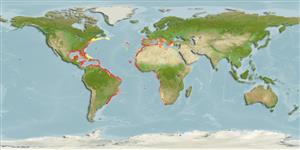>
Carangiformes (Jacks) >
Carangidae (Jacks and pompanos) > Caranginae
Etymology: Caranx: French, carangue, the name of a Caribbean fish; 1836 (Ref. 45335).
More on author: Linnaeus.
Environment: milieu / climate zone / depth range / distribution range
بوم شناسي
دريايي; لب شور; اقیانوس رو (Ref. 51243); تغييرات عمق 1 - 350 m (Ref. 7097), usually 1 - 200 m (Ref. 55173). Subtropical
Atlantic Ocean, restricted to continental shelf areas. Mediterranean excluded.
Length at first maturity / Size / Weight / سن
Maturity: Lm 66.0 range ? - ? cm
Max length : 124 cm TL جنس نر / بدون خواص جنسي; (Ref. 5217); common length : 75.0 cm TL جنس نر / بدون خواص جنسي; (Ref. 2683); بيشينه وزن گزارش شده: 32.0 kg (Ref. 27584)
خارهاي باله پشتي (کل) : 9; شعاع نرم باله پشتي (کل) : 19 - 22; خارهاي باله مخرجي: 3; شعاع نرم باله مخرجي: 15 - 18. Diagnosis: Scutes on lateral line 23 (Ref. 57392) to 42 (Ref. 13442). No scales on chest (Ref. 13442), except a small mid-ventral patch in front of pelvic fins (Ref. 13442, 57392). Upper profile of head steep (Ref. 13442). Maxilla ending approximately below (Ref. 13442, 57392) or beyond (Ref. 57392) posterior edge of eye (in adult). Front of soft dorsal and anal fins elevated; olivaceous to bluish green dorsally, silvery to brassy on the sides; prominent black spot posteriorly on gill cover at level of eye, another at upper axil of pectoral fins, and often a third on lower pectoral rays; caudal yellowish (Ref. 13442).
Generally in neritic waters over the continental shelf (Ref. 5217), from the coastline, where it is common on shallow flats, to offshore waters (Ref. 57392). Adults ascend rivers (Ref. 26938). Juveniles abundant in brackish estuaries with muddy bottoms, near sandy beaches and on seagrass beds (Ref. 5217), entering lagoons and lower courses of rivers (Ref. 57392). They form fast-moving schools, although larger fish may be solitary. They feed on smaller fish, shrimp, and other invertebrates (Ref. 5521). Often grunts or croaks are heard when caught. Eggs are pelagic (Ref. 4233).
Life cycle and mating behavior
بلوغ | تولید مثل | تخم ریزی | تخم ها | Fecundity | توزاد ( لارو)
Smith-Vaniz, W.F. and K.E. Carpenter, 2007. Review of the crevalle jacks, Caranx hippos complex (Teleostei: Carangidae), with a description of a new species from West Africa. Fish. Bull. 105(2):207-233. (Ref. 58464)
وضعيت در فهرست قرمز IUCN (Ref. 130435: Version 2024-1)
خطر برای انسان ها
Reports of ciguatera poisoning (Ref. 4690)
استفاده انسانی
ماهي گيري – شيلات: تجاري; ماهي ها ي سرگرم كننده: بله
ابزارها
گزارش های ويژه
بارگيری XML
منابع اينترنتي
Estimates based on models
Preferred temperature (Ref.
123201): 16.5 - 27.9, mean 24.8 °C (based on 2020 cells).
Phylogenetic diversity index (Ref.
82804): PD
50 = 0.5000 [Uniqueness, from 0.5 = low to 2.0 = high].
Bayesian length-weight: a=0.01622 (0.01359 - 0.01936), b=2.96 (2.93 - 2.99), in cm total length, based on LWR estimates for this species (Ref.
93245).
Trophic level (Ref.
69278): 3.6 ±0.4 se; based on diet studies.
Generation time: 3.1 ( na - na) years. Estimated as median ln(3)/K based on 1
growth studies.
جهندگی (Ref.
120179): متوسط, كمينه زمان لازم براي دو برابر شدن جمعيت 4/1 – 4/4 سال (Assuming tm 3-4).
Prior r = 0.53, 95% CL = 0.35 - 0.80, Based on 5 data-limited stock assessments.
Fishing Vulnerability (Ref.
59153): Moderate vulnerability (41 of 100).
Climate Vulnerability (Ref.
125649): High vulnerability (62 of 100).
Nutrients (Ref.
124155): Calcium = 10.9 [4.1, 19.9] mg/100g; Iron = 0.33 [0.17, 0.68] mg/100g; Protein = 20.9 [18.7, 23.4] %; Omega3 = 0.218 [0.121, 0.391] g/100g; Selenium = 33.8 [14.2, 84.4] μg/100g; VitaminA = 16 [5, 56] μg/100g; Zinc = 0.357 [0.217, 0.574] mg/100g (wet weight); based on
nutrient studies.
